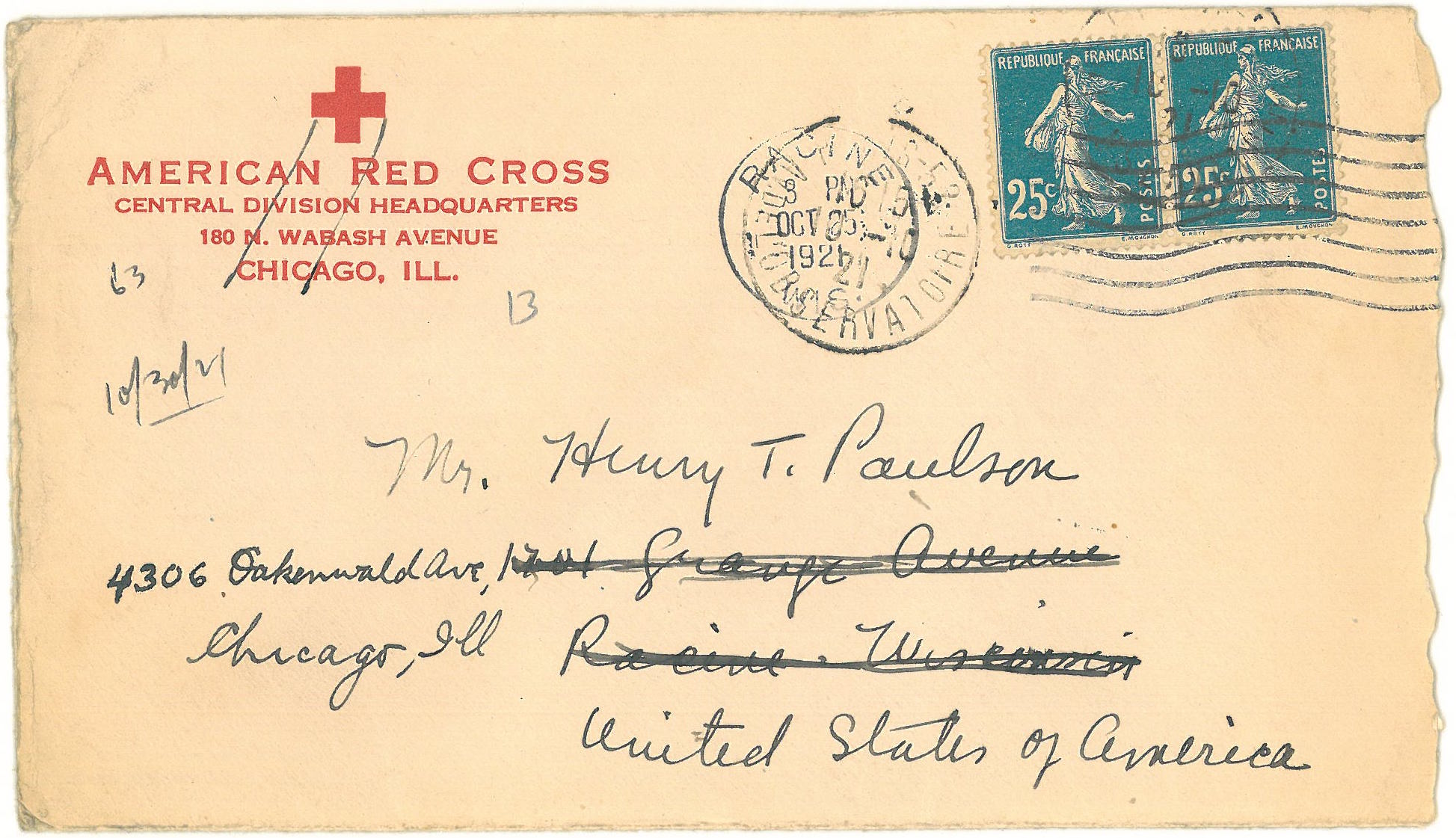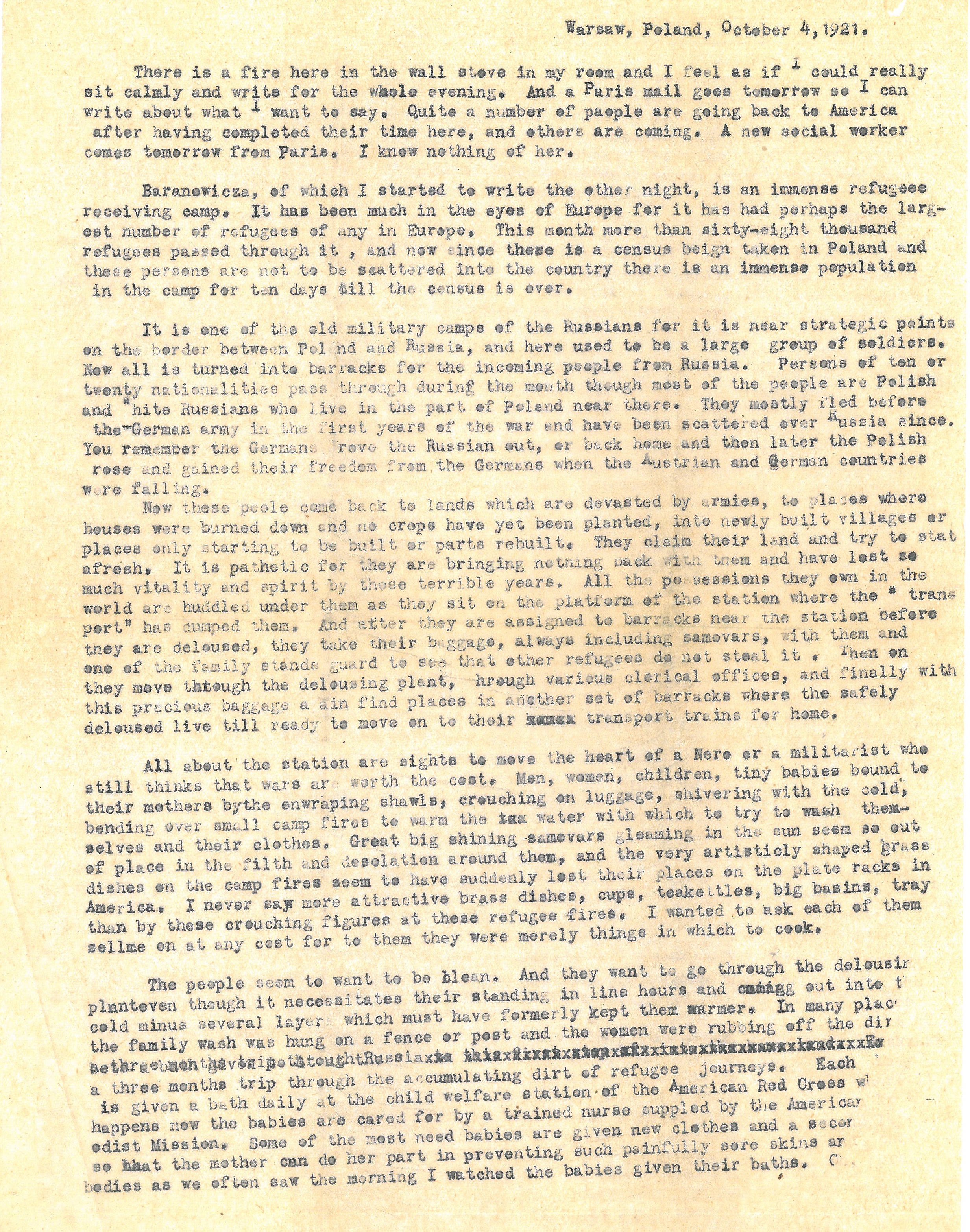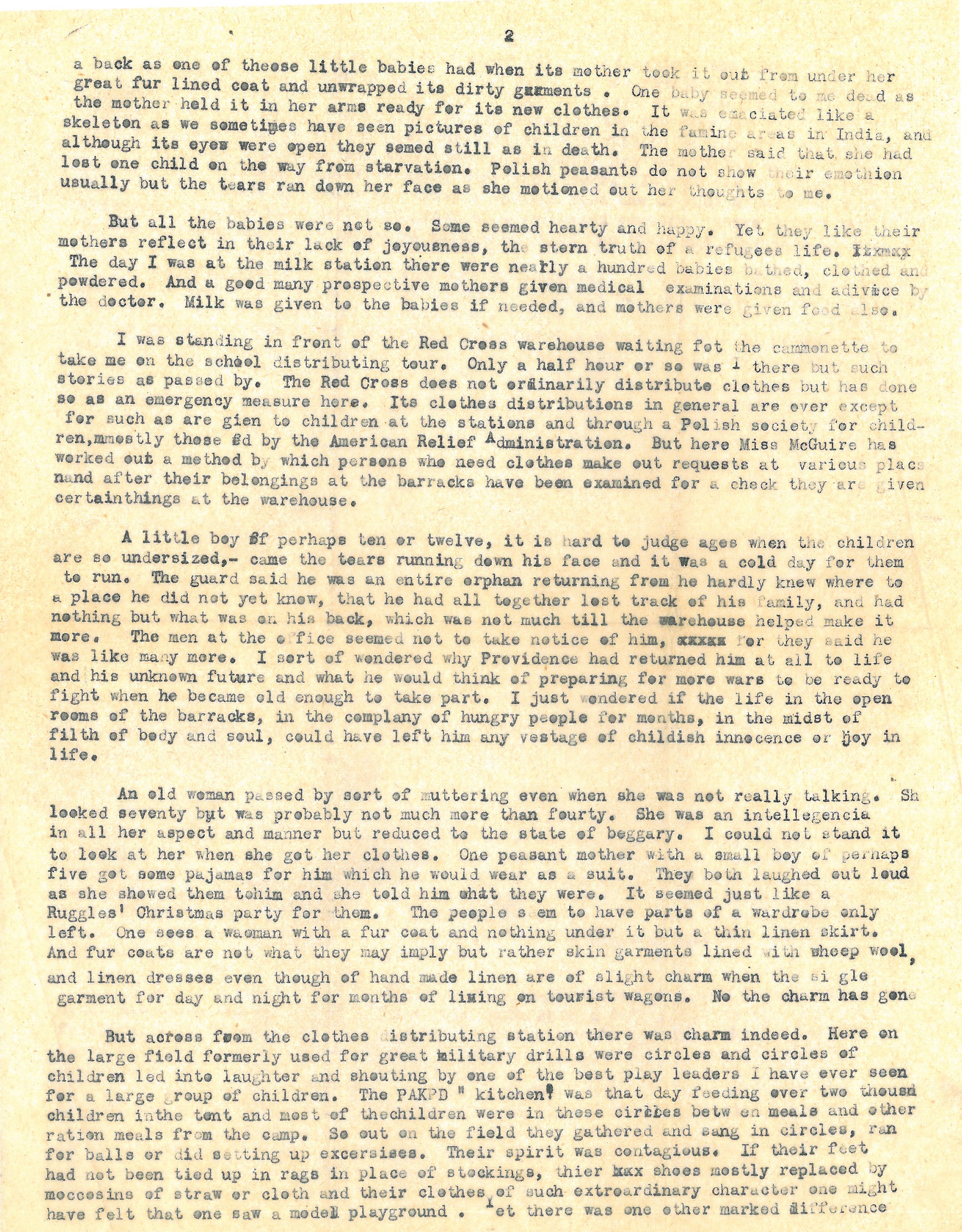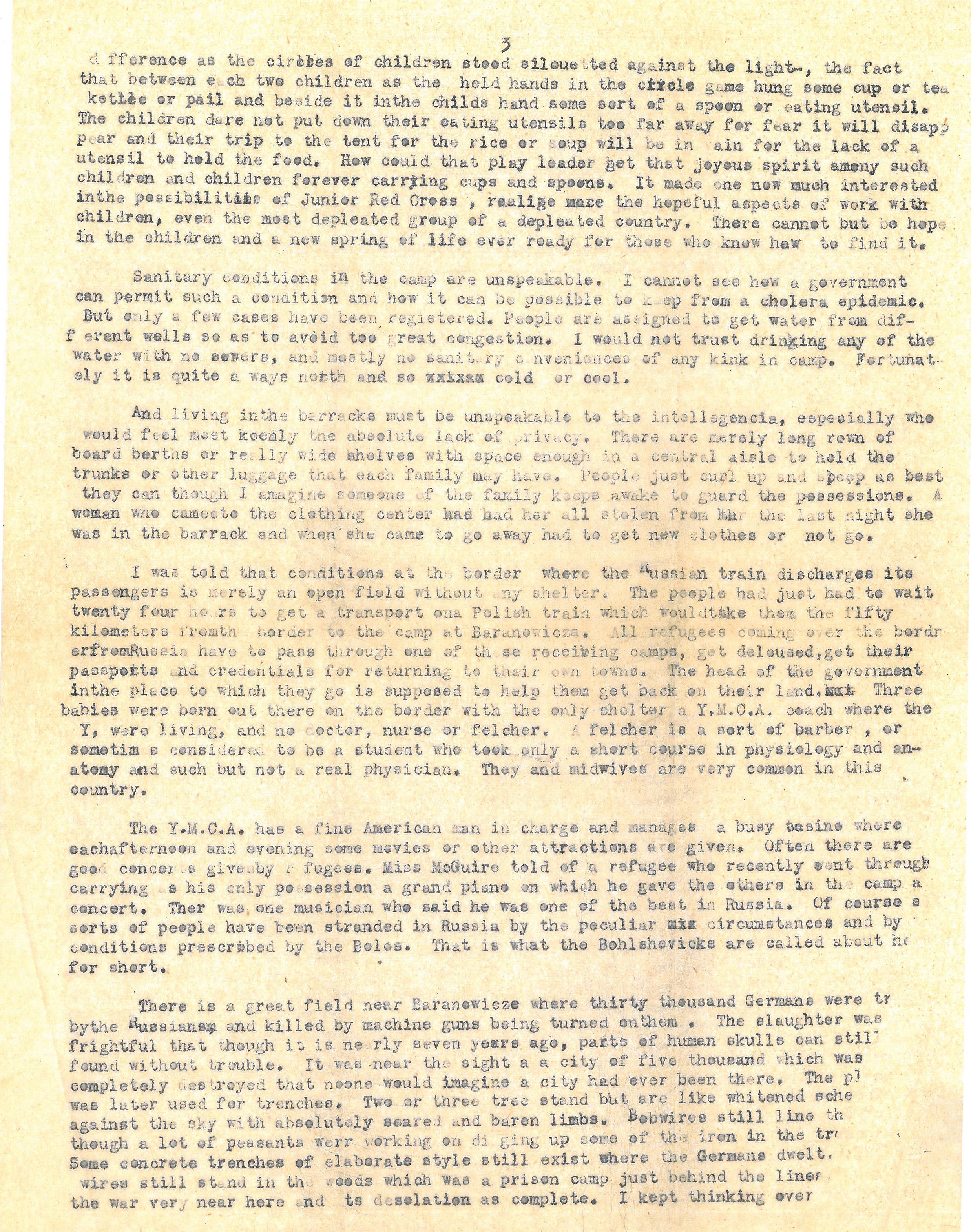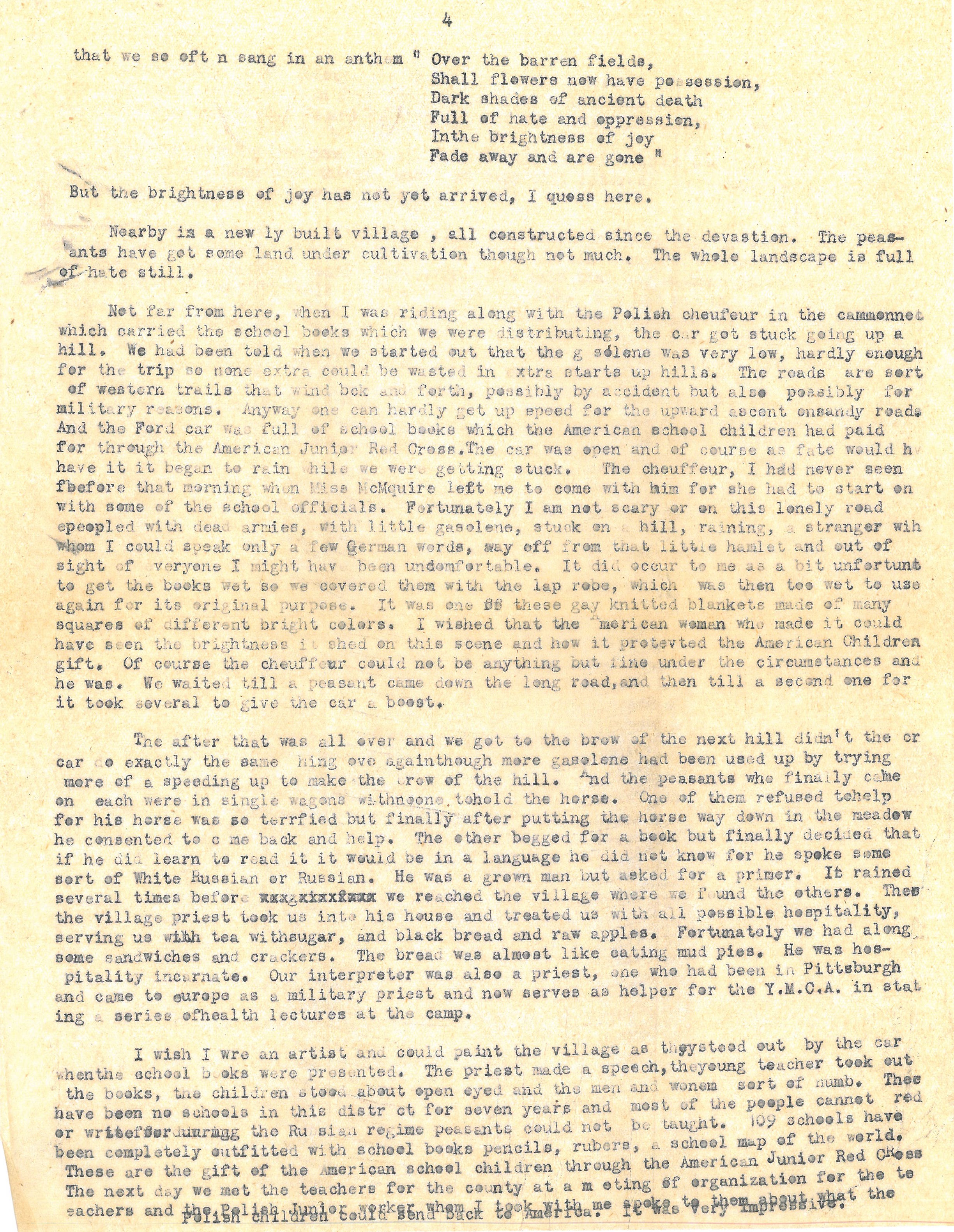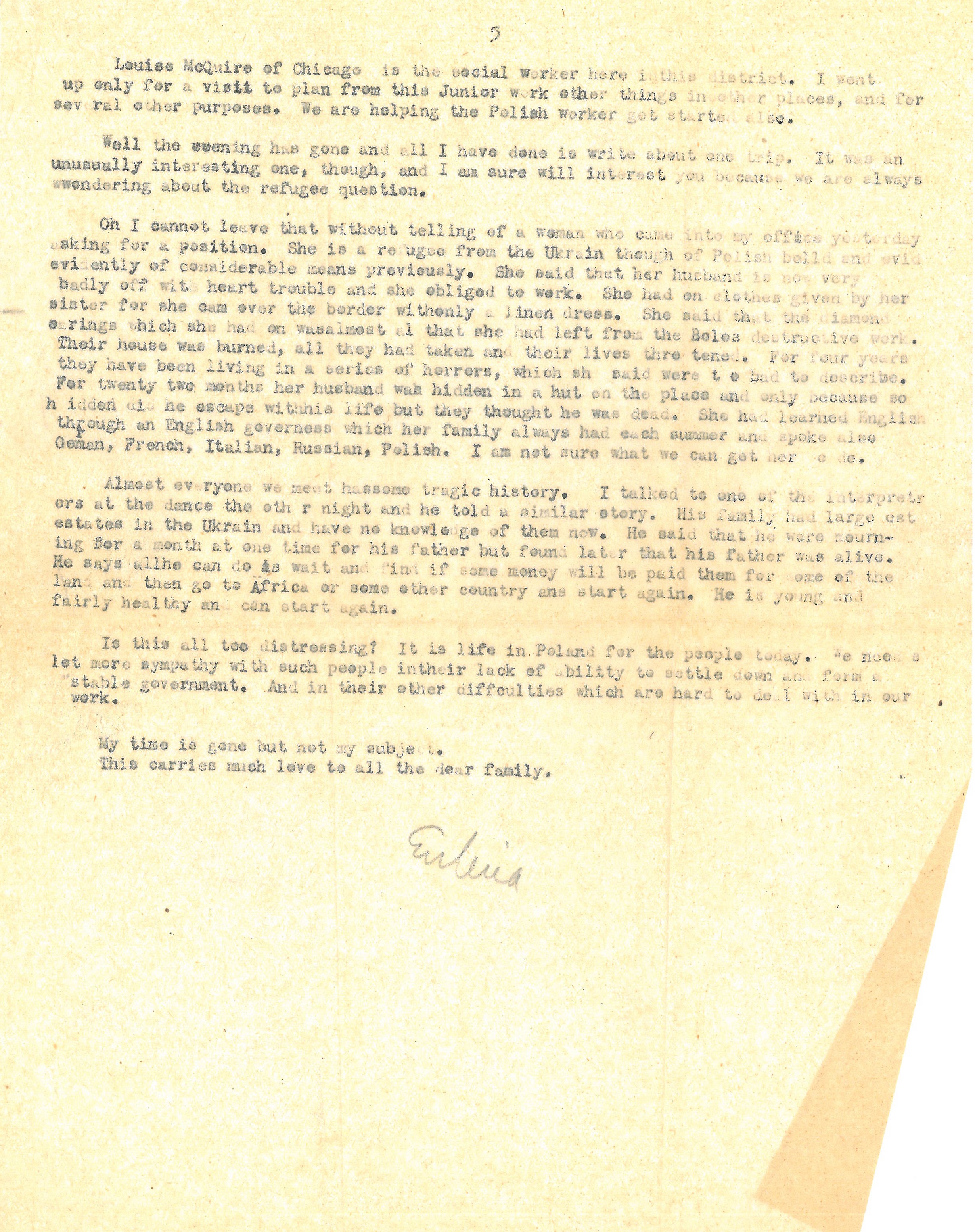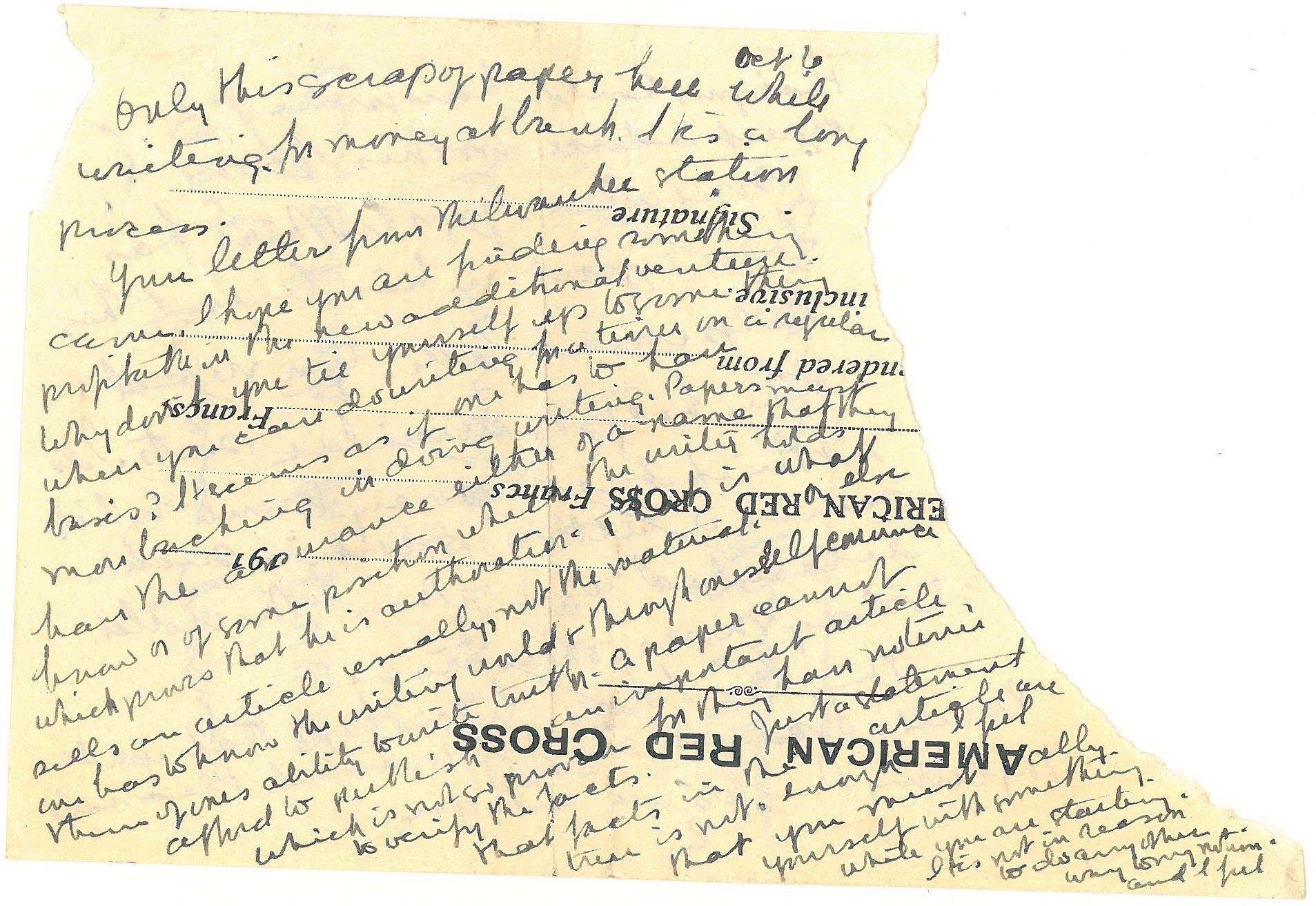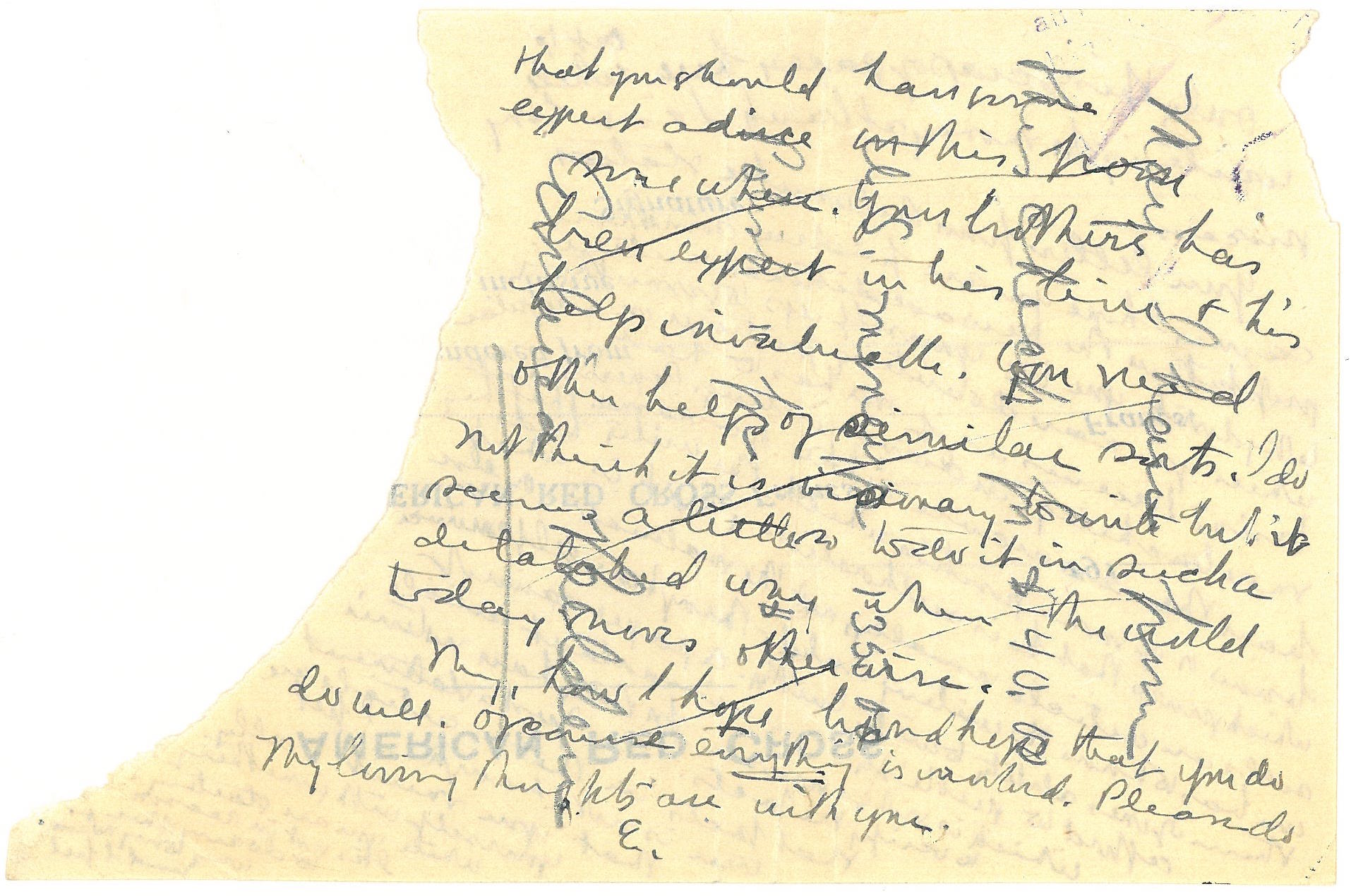From Hiram House to Warsaw: Evelina Belden Paulson’s Internationalist Extension of Social Work
Document 1: 22 August 1921 | Document 2: 8 September 1921
Document 3: 22 September 1921 | Document 4: 1 October 1921
Document 5: 4 October 1921 | Document 6: 2 December 1921
Bibliography
Author: Evelina Belden
Recipient: Henry Thomas Paulson
Date: 4 October 1921
Document Type: Typed Document
Location: Evelina Belden Paulson Papers, RG 30/406, Series II, Box 3, Letter No. 2188, O. C. A.
Introduction:
In the following letter, Evelina Belden wrote Henry Thomas Paulson about the details of the suffering of refugees in Baranowice. As she describes, the Poles who fled or were forcibly evacuated during the war have returned to economic devastation and little resources. Many families lost the entirety of their possessions and did not even have adequate clothing for the weather. Belden described the plight of children in particular, especially babies she sees that are emaciated from starvation, and a small orphaned boy who has lost his whole family in the war. This letter carries a grave tone; here, Belden detailed the suffering she sees, without her confidence in the process of ameliorating evil one step at a time.
Original Both Transcription
|
|
Transcription: Warsaw, Poland, October 4, 1921
There is a fire here in the wall stove in my room and I feel as if I could really sit calmly and write for the whole evening. And a Paris mail goes tomorrow so I can write about what I want to say. Quite a number of people are going back to America after having completed their time here, and others are coming. A new social worker comes tomorrow from Paris. I know nothing of her.
Baranowicza[1], of which I started to write the other night, is an immense refugee receiving camp. It has been much in the eyes of Europe for it has had perhaps the largest number of refugees of any in Europe. This month more than sixty-eight thousand refugees passed through it, and now since there is a census beign [sic] taken in Poland and these persons are not to be scattered into the country there is an immense population in the camp for ten days till the census is over.
It is one of the old military camps of the Russians for it is near strategic points on the border between Poland and Russia, and here used to be a large group of soldiers. Now all is turned into barracks for the incoming people from Russia. Persons of ten or twenty nationalities pass through during the month though most of the people are Polish and hite [sic] Russians who live in the part of Poland near there. They mostly fled before the German army in the first years of the war and have been scattered over Russia since. You remember the Germans drove the Russian [sic] out, or back home and then later the Polish rose and gained their freedom from the Germans when the Austrian and German countries were falling. Now these people come back to lands which are devastated by armies, to places where houses were burned down and no crops have yet been planted, into newly built villages or places only starting to be built or parts rebuilt. They claim their land and try to stat [sic] afresh. It is pathetic for they are bringing nothing back with them and have lost so much vitality and spirit by these terrible years. All the possessions they own in the world are huddled under them as they sit on the platform of the station where the “transport” has dumped them. And after they are assigned to barracks near the station before they are deloused, they take their baggage, always including samovars, with them and one of the family stands guard to see that other refugees do not steal it. Then on they move through the delousing plant, hrough [sic] various clerical offices, and finally with this precious baggage a ain [sic] find places in another set of barracks where the safely deloused[2] live till ready to move on to their xxxx transport trains for home. All about the station are sights to move the heart of a Nero[3] or a militarist who still thinks that wars are worth the cost. Men, women, children, tiny babies bound to their mothers bythe [sic] enwrpping [sic] shawls, crouching on luggage, shivering with the cold, bending over small camp fires to warm the xxx water with which to try to wash themselves and their clothes. Great big shining samovars[4] gleaming in the sun seem so out of place in the filth and desolation around them, and the very artisticly [sic] shaped brass dishes on the camp fires seem to have suddenly lost their places on the plate racks in America. I never saw more attractive brass dishes, cups, teakettles, big basins, tray [sic] than by these crouching figures at these refugee fires. I wanted to ask each of them sellme [sic] on [sic] at any cost for to them there were merely things in which to cook. The people seem to want to be clean. And they want to go through the delousing planteven [sic] though it necessitates their standing in line hours and cmmgg [sic] out into the cold minus several layer [sic] which must have formerly kept them warmer. In many plac [sic] the family wash was hung on a fence or post and the women were rubbing off the dir [sic] […unintelligible…] a three months trip through the accumulating dirt of refugee journeys. Each is given a bath daily at the child welfare station of the American Red Cross wh[sic] happens now the babies are cared for by a trained nurse suppled [sic] by the American odist [sic] Mission. Some of the most need babies are given new clothes and a second se [sic] that the mother can do her part in preventing such painfully sore skins and bodies as we often saw the morning I watched the babies given their baths. O [sic] a back as one of theose [sic] little babies had when its mother took it out from under her great fur lined coat and unwrapped its dirty garmets. One baby seemed to me dead as the mother held it in her arms ready for its new clothes. It was emaciated like a skeleton as we sometimes have seen pictures of children in the famine areas in India, and although its eyes were open they semed [sic] still as in death. the mother said that she had lost one child on the way from starvation. Polish peasants do not show their emothion [sic] usually but the tears ran down her face as she motioned out her thoughts to me. But all the babies were not so. Some seemed hearty and happy. Yet they like their mothers reflect in their lack of joyousness, the stern truth of a refugees [sic] life. xxxxxx The day I was at the milk station there were nearly a hundred babies bathed, clothed and powdered. And a good many prospective mothers given medical examinations and adivice [sic] by the doctor. Milk was given to the babies if needed, and mothers were given food also. I was standing in front of the Red Cross warehouse waiting fot [sic] the cammonette to take me on the school distributing tour. Only a half hour or so was I there but such stories as passed by. The Red Cross does not ordinarily distribute clothes but has done so as an emergency measure here. Its clothes distributions in general are over except for such as are gien [sic] to children at the stations and through a Polish society for children, mmostly [sic] those fed by the American Relief Administration. But here Miss McGuire has worked out a method by which persons who need clothes make out requests at various placs [sic] nand [sic] after their belongings at the barracks have been examined for a check they are given certainthings [sic] at the warehouse. A little boy of perhaps ten or twelve, it is hard to judge ages when the children are so undersized,–came the tears running down his face and it was a cold day form them to run. The guard said he was an entire orphan returning from he hardly knew where to a place he did not yet know, that he had all together lost track of his family, and had nothing but what was on his back, which was not much till the warehouse helped make it more. The men at the office seemed not to take notice of him, xxxxx or they said he was like many more. I sort of wondered why Providence had returned him at all to life and his unknown future and what he would think of preparing for more wars to be ready to fight when he became old enough to take part. I just wondered if the life in the open rooms of the barracks, in the complany [sic] of hungry people for months, in the midst of filth of body and soul, could have left him any vestage [sic] of childish innocence or joy in life. An old woman passed by sort of muttering even when she was not really talking. She looked seventy but was probably not much more than fourty [sic]. She was an intellegencia [sic] in all her aspect and manner but reduced to the state of beggary. I could not stand it to look at her when she got her clothes. One peasant mother with a small boy of perhaps five got some pajamas for him which he would wear as a suit. They both laughed out loud as she showed them tohim [sic] and she told him what they were. It seemed just like a Ruggles’ Christmas party for them. The people seem to have parts of a wardrobe only left. One sees a waoman [sic] with a fur coat and nothing under it but a thin linen skirt. And fur coats are not what they may imply but rather skin garments lined with sheep wool, and linen dresses even though of hand made linen are of slight charm when the si gle [single] garment for day and night for months of living on tourist wagons. No the charm has gone [sic] But across from the clothes distributing station there was charm indeed. Here on the large field formerly used for great military drills were circles and cirlces of children led into laughter and shouting by one of the best play leaders I have ever seen for a large group of children. The PAKPD[5] “kitchen” was that day feeding over two thousd [sic] children inthe [sic] tent and most of thechildren [sic] were in these circles between meals and other for balls or did setting up exersises [sic]. Their spirit was contagious. If their feet had not been tied up in rags in place of stockings, thier [sic] xxx shoes mostly replaced by moccosins [sic] of straw or cloth and their clothes of such extroardinary [sic] character one might have felt that one saw a model playground. Yet there was one other marked difference difference [sic] as the circles of children stood silouetted [sic] against the light-, [sic] the fact that between each two children as the held hands in the circle game hung some cup or tea kettle or pail and beside it inthe [sic] childs hand some sort of a spoon or eating utensil. The children dare not put down their eating utensils too far away for fear it will disapppear [sic] and their trip to the tent for the rice or soup will be in vain for the lack of a utensil to hold their food. How could that play leader get that joyous spirit amony [sic] such children and children forever carrying cups and spoons. It made one now much interested in the possibilities of Junior Red Cross, realize more the hopeful aspects of work with children, even the most depleated group of a depleated country. There cannot but be hope in the children and a new spring of life ever ready for those who know how to find it. Sanitary conditions in the camp are unspeakable. I cannot see how a government can permit such a condition and how it can be possible to keep from a cholera epidemic. But only a few cases have been registered. People are assigned to get water from different wells so as to avoid too great congestion. I would not trust drinking any of the water with no [sewers?], and mostly no sanitary conveniences of any kink [kind] in camp. Fortunately it is quite a way north and so xxxxxx cold or cool. And living in the barracks must be unspeakable to the intellegencia [sic], especially who would feel most keenly the absolute lack of privacy. There are merely long rown [sic] of board berths or really wide shelves with space enough in a central aisle to hold the trunks or other luggage that each family may have. People just curl up and sleep as best they can though I amagine [sic] someone of the family keeps awake to guard the possessions. A woman who cameeto [sic] the clothing center had had [sic] her all stolen from her the last night she was in the barrack and when she came to go away had to get new clothes or not go. I was told that conditions at the border where the Russian train discharges its passengers is merely an open field without any shelter. The people had just had to wait twenty four hours to get a transport ona [sic] Polish train which would take them the fifty kilometers fromth [sic] border to the camp at Baranowicza. All refugees coming over the bordrerfromRussia [sic] have to pass through one of those receiving camps, get deloused, get their passports and credentials for returning to their own towns. The head of the government in the place to which they go is supposed to help them get back on their land. xxx Three babies were born out there on the border with the only shelter a Y. M. C. A. coach where the Y, were living, and no doctor, nurse or felcher. A felcher is a sort of barber, or sometimes considered to be a student who took only a short course in physiology and anatomy and such but not a real physician. They and midwives are very common in this country. The Y. M. C. A. has a fine American man in charge and manages a busy [illegible] where eachafternoon [sic] and evening some movies or other attractions are given. Often there are good concerts givenby [sic] refugees. Miss McGuire told of a refugee who recently went through carrying as his only possession a grand piano on which he gave the others in the camp a concert. Ther [sic] was one musician who said he was one of the best in Russia. Of course a sorts [sic] of people have been stranded in Russia by the peculiar xxx circumstances and by conditions prescribed by the Bolos. That is what the Bohlshevicks [sic] are called about he [sic] for short. There is a great field near Baranowicze where thirty thousand Germans were t [typewriter cut out] by the Russiansm [sic] and killed by machine guns being turned on them. The slaughter was frightful that though it is nearly seven years ago, parts of human skulls can still [typewriter cut out] found without trouble. It was near the sight a a [sic] city of five thousand which was completely destroyed that noone [sic] would imagine a city had ever been there. The pl [typewriter cut out] was later used for trenches. Two or three tree stand [sic] but are likely whitened sche [typewriter cut out] against the sky with absolutely seared and baren [sic] limbs. Bobwires [sic] still line th [typewriter cut out] though a lot of peasants werr [sic] working on di ging [digging] up some of the iron in the tr [typewriter cut out] Some concrete trenches of elaborate style still exist where the Germans dwelt [typewriter cut out] wires still stand in the woods which was a prison camp just behind the lines [typewriter cut out] the war very near here and ts [sic] desolation as complete. I kept thinking over [typewriter cut out] that we so oft n [often] sang in an anthem “Over the barren fields, Shall flowers now have possession, Dark shades of ancient death Full of hate and oppression Inthe [sic] brightness of joy Fade away and are gone” But the brightness of joy has not yet arrived, I quess [sic] here. Nearby is a new ly [sic] built village, all constructed since the devastion [sic]. The peasants have got some land under cultivation though not much. THe whole landscape is full of hate still. Not far from here, when I was riding along with the Polish cheufeur [sic] in the cammonnet which carried the school books which we were distributing, the car got stuck going up a hill. We had been told when we started out that the g solene [gasoline] was very low, hardly enough for the trip so none extra could be wasted in xtra [sic] starts up hills. The roads are sort of western trails that wind bck [sic] and forth, possibly by accident but also possibly for military reasons. Anyway one can hardly get up speed for the upward ascent onsandy [sic] roads. And the Ford car was full of school books which the American school children had paid for through the American Junior Red Cross. The car was open and of course as fate would h have [sic] it it began to rain while we were getting stuck. The cheuffeur [sic], I had never seen fbefore [sic] that morning when Miss McMquire [sic] left me to come with him for she had to start on with some of the school officials. Fortunately I am not scary or on this lonely road epeopled [sic] with dead armies, with little gasolene [sic], stuck on a hill, raining, a stranger wih [sic] whom I could speak only a few German words, away off from that little hamlet and out of sight of everyone I might hav [sic] been uncomfortable. It did occur to me as a bit unfortunte [sic] to get the books wet so we covered them with the lap robe, which was then too wet to use again for its original purpose. It was one of these gay knitted blankets made of many squares of different bright colors. I wished that the American woman who made it could have seen the brightness it shed on this scene and how it protevted [sic] the American Children gift. We waited till a peasant came down the long road, and then till a second one for it took several to give the car a boost. The [sic] after that was all over and we got to the brow of the next hill didn’t the cr [sic] car do exactly the same hing [thing] ove [over] againthough [sic] more gasolene [sic] had been used up by trying more of a speeding up to make the brow of the hill. And the peasants who finally came on each were in single wagons withnoone [sic] tohold [sic] the horse. One of them refused tohelp [sic] for his horse was so terrified but finally after putting the horse way down in the meadow he consented to c me [come] back and help. The other begged for a book but finally decided that if he did learn to read it it [sic] would be in a language he did not know for he spoke some sort of White Russian[6] or Russian. He was a grown man but asked for a primer. It rained several times before xxxxxxxxxxxx we reached the village where we found the others. Thee [sic] the village priest took us into his house and treated us with all possible hospitality, serving us with tea withsugar [sic], and black bread and raw apples. Fortunately we had along some sandwiches and crackers. The bread was almost like eating mud pies. He was hospitality incarnate. Our interpreter was also a priest, one who had been in Pittsburgh and came to europe [sic] as a military priest and now serves as helper for the Y. M. C. A. in stating a series ofhealth [sic] lectures at the camp. I wish I wre [sic] an artist an could paint the village as theystood [sic] out by the car whenthe [sic] school books were presented. The priest made a speech, theyoung [sic] teacher took out the books, the children stood about open eyed and the men and wonem [sic] sort of numb. Thee [sic] have been no schools in this distr ct [district] for seven years and most of the people cannot red [read] or writeforduringg [sic] the Russian regime peasants could not be taught. 109 schools have been completely outfitted with school books and pencils, rubers, a school map of the world. These are the gift of the American school children through the American Junior Red CRoss [sic] The next day we met the teachers for the county at a m eting [meeting] of organization for the teeacher [sic] and the Polish Junior worker whom I took with me spoke to them about what the Polish children could send back to America. It was very impressive. Louise McQuire of Chicago is the social worker here in this district. I went up only for a visit to plan from this Junior work other things in other places, and for several other purposes. We are helping the Polish worker get started also. Well the evening has gone and all I have done is write about one trip. It was an unusually interesting one, though, and I am sure will interest you because we are always wwondering [sic] about the refugee question. Oh I cannot leave that without telling of a woman who came into my office yesterday asking for a position. She is a refugee from the Ukrain [sic] though of Polish bolld [blood] and evid [sic] evidently of considerable means previously. She said that her husband is now very badly off with heart trouble and she obliged to work. She had on clothes given by her sister for she cam [sic] over the border withonly [sic] a linen dress. She said that the diamond earings [sic] which she had on wasalmost [sic] al [sic] that she had left from the Bolos destructive work. Their house was burned, all they had taken and their lives thre tened [threatened]. For four years they have been living in a series of horrors, which sh [sic] said were t o [sic] bad to describe. For twenty two months her husband was hidden in a hut on the place and only because so hidden did he escape withhis [sic] life but they thought he was dead. She had learned English through an English governess which her family always had each summer and spoke also German, French, Italian, Russian, Polish. I am not sure what we can get her [to] do. Almost everyone we meet hassome [sic] tragic history. I talked to one of the interpretrers [sic] at the dance the oth r [other] night and he told a similar story. His family had large estestates [sic] in the Ukrain [sic] and have no knowledge of them now. He said that he were mourning for a month at one time for his father but found later that his father was alive. He says allhe [sic] can do is wait and find if some money will be paid them for some of the land and then go to Africa or some other country ans [and] start again. He is young and fairly healthy an [sic] can start again. Is this all too distressing? It is life in Poland for the people today. We need a let more sympathy with such people intheir [sic] lack of ability to settle down and form a stable government. And in their other difficulties which are hard to deal with in our work.
My time is gone but not my subject. This carries much love to all the dear family.
[Signed: Evelina] |
[1] Most likely Baranovichi, Belarus, a town formerly part of Poland, and the site of a refugee camp in 1919 for Poles returning from Russia, where they had fled during World War I. There are multiple towns today in Poland called Baranowicze, but they were almost all part of Germany before 1945. Baranovichi is the most likely location for the camp since it was close to the 1919 Russian border.
[2] To rid of lice or other parasitic insects.
[3] Imperator Nero Cladius Divi Claudius filius Caesar Augustus Germanicus (37-68 AD) was the Roman emperor from 54 to 68.
[4] A samovar is a device traditionally used to heat water for tea. The word is Russian, although samovars are used throughout Eastern Europe, Central Europe, Kashmir, and the Middle East.
[5] Likely Polsko-Amerykanski komitet pomocy dzieciom, a European children’s fund mission to Poland active from 1919 to 1922 (American Relief Administration, Warsaw, Galewski & Dau, Columbia University Libraries, accessed 22 August 2016, Source).
[6] White Russians was another name for anti-communists, symbolized through white, as opposed to the communists, the “reds.”
